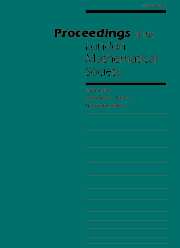Article contents
ON THE PAIR CORRELATION OF ZEROS OF THE RIEMANN ZETA-FUNCTION
Published online by Cambridge University Press: 01 January 2000
Abstract
To study the distribution of pairs of zeros of the Riemann zeta-function, Montgomery introduced the function $$ F(\alpha) = F_T(\alpha) = \left({T\over 2\pi}\log T\right)^{-1} \sum_{0<\gamma,\gamma ' \le T} T^{i\alpha(\gamma -\gamma ')}w(\gamma-\gamma '), $$ where $\alpha$ is real and $T\ge 2$, $\gamma$ and $\gamma '$ denote the imaginary parts of zeros of the Riemann zeta-function, and $w(u) = 4/(4 + u^2)$. Assuming the Riemann Hypothesis, Montgomery proved an asymptotic formula for $F(\alpha)$ when $|\alpha|\le 1$, and made the conjecture that $F(\alpha) = 1 + o(1)$ as $T\to \infty$ for any bounded $\alpha$ with $|\alpha |\ge 1$. In this paper we use an approximation for the prime indicator function together with a new mean value theorem for long Dirichlet polynomials and tails of Dirichlet series to prove that, assuming the Generalized Riemann Hypothesis for all Dirichlet $L$-functions, then for any $\epsilon >0$ we have $$ F(\alpha) \ge {3\over 2} - |\alpha| - \epsilon ,$$ uniformly for $1\le |\alpha| \le \frac32 -2\epsilon $ and all $T \ge T_0(\epsilon)$.
1991 Mathematics Subject Classification: primary 11M26; secondary 11P32.
- Type
- Research Article
- Information
- Copyright
- 2000 London Mathematical Society
- 9
- Cited by




